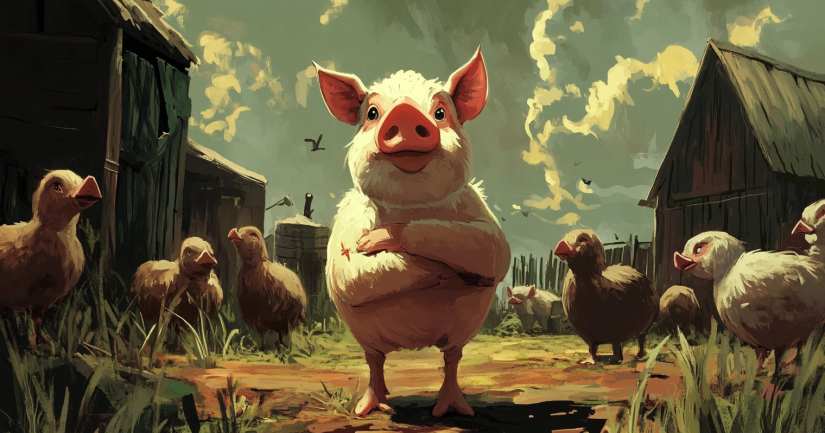
Delve into the depth of Orwell’s Animal Farm by identifying Animal Farm Literary Devices Quiz – Test Your Understanding of Orwell’s Writing Techniques. The Animal Farm Literary Devices Quiz helps readers explore the techniques George Orwell uses to enhance his political allegory. This quiz challenges you to identify key literary devices, including symbolism, irony, foreshadowing, and propaganda. Each of these techniques strengthens the novel’s critique of totalitarianism and political manipulation.
Practice recognizing key characters in our Animal Farm Character Matching Quiz. Orwell’s novel is not just a fable—it is a sophisticated allegory that relies on literary techniques to expose the dangers of authoritarian rule. Through symbolism, he connects fictional events to historical realities. With dramatic irony, he highlights the hypocrisy of leadership. Taking the Animal Farm Literary Devices Quiz will improve your ability to recognize these elements and understand their impact on the story.
Your Animal Farm Literary Devices Quiz Starts Here – Are You Ready?
What Literary Devices Appear in Animal Farm?
The Animal Farm Literary Devices Quiz includes questions on the most significant techniques Orwell employs, including:
- Allegory – The novel serves as a symbolic retelling of the Russian Revolution.
- Symbolism – Each character and event represents real-world political figures and historical moments.
- Irony – The animals believe they have achieved freedom, yet they remain under oppression.
- Propaganda – Squealer manipulates language to justify Napoleon’s rule and maintain control.
- Foreshadowing – Early warnings in the novel hint at the eventual betrayal of revolutionary ideals.
Each of these techniques plays a crucial role in shaping Orwell’s message. Understanding them will help you analyze how Orwell critiques dictatorship, propaganda, and class struggle.
How Does Identifying Literary Devices Improve Interpretation?
Recognizing Orwell’s use of literary techniques allows readers to engage with the novel on a deeper level. His use of language is deliberate, exposing the ways in which leaders distort reality and rewrite history. Identifying these devices strengthens comprehension of Orwell’s critique of authoritarianism.
For instance, Orwell’s repetition of slogans like “Napoleon is always right” demonstrates how totalitarian regimes manipulate language. His use of paradox in “All animals are equal, but some animals are more equal than others” highlights the contradictions within oppressive systems. Analyzing these techniques enhances appreciation for Orwell’s work.
Take the Animal Farm Literary Devices Quiz Now!
How well do you understand Orwell’s literary techniques? The Animal Farm Literary Devices Quiz challenges you to recognize and analyze the novel’s most powerful writing strategies. Whether you are preparing for an exam or exploring Orwell’s craftsmanship, this quiz will sharpen your literary analysis skills. Take the quiz now!
Enter Orwell’s World of rebellion and power – test yourself with the Animal Farm Book Quiz.
Interested in Orwell’s writing style? or put your knowledge to the test with our Animal Farm True Or False Quiz.
Animal Farm Literary Devices – FAQ
Animal Farm, by George Orwell, uses allegory, symbolism, and satire. Allegory represents the Russian Revolution and totalitarianism. Symbolism appears through characters and events, with pigs symbolizing the ruling class. Satire critiques political systems and human nature, making the story both entertaining and thought-provoking.
Symbolism is vital in Animal Farm. The farm symbolizes society, while characters like Napoleon and Snowball represent historical figures such as Stalin and Trotsky. The windmill symbolizes the animals’ hard work and the false promises of a better future. These symbols enrich the themes, showing how power can corrupt and the dangers of blind loyalty.
Irony is significant in Animal Farm, especially situational irony. The animals seek equality and freedom but end up under the oppressive rule of the pigs. The slogan, All animals are equal, but some animals are more equal than others, exemplifies this irony, highlighting the betrayal of their original ideals and the cyclical nature of power.
The literary devices in Animal Farm emphasize themes like the corrupting influence of power, the importance of critical thinking, and the dangers of propaganda. Through allegory and symbolism, Orwell shows how noble ideas can be distorted, while satire underscores the absurdities of political systems, urging readers to question authority and recognize manipulation in their societies.
